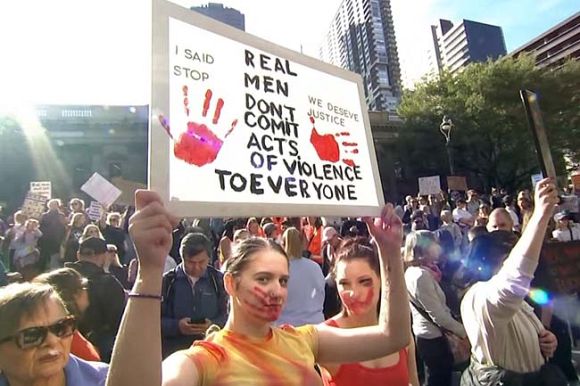It's no surprise that violence against women is continuing — we need to challenge patriarchy's toxic masculinity and face the elephant in the room, writes Michelle Panayi.
* CONTENT WARNING: This article discusses domestic violence
THE TOLL OF AUSTRALIAN WOMEN killed this year is reported to be 103 without recording any of the hundreds of women committing suicide to escape the terror of their abuser.
We all know we need men to help end gender-based violence to stop it before it begins including calling out any disrespect of women and girls, discussing what healthy masculinity looks like, and being positive role models. But this means we need to talk about patriarchy and its harmful gender stereotyping firmly embedded in all aspects of our society and culture — and, face the elephant in the room.
Not only does patriarchy carve up certain roles for each gender, such as housework for women and leadership roles for men. It also assigns so-called "masculine" qualities to men such as reason/intellect, independence, assertiveness, and initiative, and highly values these.
Meanwhile, what is commonly referred to as "feminine" qualities and attributes are assigned to women such as empathy, intuition, relatedness, nurturing, humility, and patience — all of which are devalued.
This irrational carving up of roles and qualities leaves us all repressing important parts of our humanity.
Also, labelling qualities as "masculine" or "feminine" is due to patriarchy’s simplistic view that the natures of men and women are inherently different when many differences are due to socialisation. These qualities should evolve to be viewed as positive opposites for us all to integrate and become whole.
It’s this wholeness that a definition of healthy masculinity must entail – rejecting patriarchy’s "tough" male ideal – a dangerous "caricature" that represses the "feminine". And, thus fueling toxic qualities such as aggression, narcissism, a sense of entitlement, the inability to accept people saying no or having a different opinion, and possessiveness.
All attributes that the Northern Territory Coroner, Elisabeth Armitage, found in the men who had killed four aboriginal women whose deaths were the subject of a recent inquest.
Underlying these are sexism and misogyny which includes the sexual objectification of women and girls. Dominating, controlling, and triumphing over others is also equated with power — and, there is a deep-seated shame about feeling vulnerable in any way which can lead to attacking others to feel powerful.
The elephant in the room is that the sex industry makes money from "toxic masculinity" as it involves the degradation and abuse of women and girls. It has a misogynistic vision of the role of women that dehumanizes us as sex objects and commodities, as mere receptacles for men’s sexual "needs".
This further fuels the toxic qualities discussed whilst involving serious human rights violations as highlighted in the landmark report by the UN Special Rapporteur on Violence Against Women and Girls that focuses on prostitution and pornography (as it is filmed prostitution).
The Special Rapporteur, Reem Alsalem, condemns this industry as a form of male violence against women – most of whom are highly vulnerable – and sex discrimination that prevents us from achieving gender equality. Alsalem found it is intrinsically linked to other forms of violence against women and girls.
Indeed, it is a driver of sexual assault and family violence, and we must remember that the 2016 Victorian Royal Commission into Family Violence found that there is a need to shape appropriate respectful attitudes towards women and end gender inequality to end violence against women.
Furthermore, it’s no surprise that comments by sexual act buyers compiled by researchers include "being with a prostitute is like having a cup of coffee, once you’re done, you throw it out", and "you can have a good time with the servitude".
One former sexual act buyer said his views had changed so much after he stopped buying sex for fifteen years that he believed if there were no prostitution there would be greater respect for women.
Meanwhile, a recent report on the high prevalence of sexual harassment of Australian female teachers found that adolescent males are propositioning teachers, threatening them with rape, and subjecting them to the mimicking of sex acts seen in pornography. Female students are also being sexually harassed. Pornography is a driving factor and I add a culture normalising the whole sex industry — and, so the disrespect and violence against women and children will continue.
All governments must heed the Special Rapporteur’s call to fully ban pornography and implement the Equality/Nordic model on prostitution which helps prostituted persons leave the industry and criminalises the sexual act buyers, pimps, and brothel owners, And, we must ban strip clubs like Iceland did in 2010.
Redefining masculinity must also include our Prime Minister saying it is not acceptable for men to purchase women, just as the German Chancellor has done. A clinical psychologist who works with perpetrators of violence against women told me, men need boundaries, which is why he supports an abolitionist approach to the sex industry to assist with men’s behaviour change and redefining masculinity.
This is essential for men in the community but also in our police forces. We know from the VEOHRC review into sexual harassment in Victoria Police in 2015 that there were reports of male police officers being consumers of pornography at work so it was no surprise that sexism and sexual harassment were not only highly prevalent but generally regarded as non-events and that there were widely held victim-blaming attitudes for sexual assault.
And, we know there has been a history of inadequate action on family violence and viewing it as "just a domestic’.
Education campaigns about the harms of the sex industry are also needed and therapeutic interventions for male consumers to experience a shift towards love, compassion and ethical thinking, specifically examine how they view and treat women, not to be ashamed of vulnerability, and to learn how to manage anger and anxiety as part of self-mastery — linked with sensitisation campaigns recommended by the Special Rapporteur for sex buyers.
They also need to embrace a different concept of power—such as inner peace. Women’s lives depend on it.
If this article has raised any issues for you, contact Lifeline on 13 11 14 or
1800RESPECT on 1800 737 732 or online at 1800RESPECT.org.au
Michelle Panayi is the author of The Rise and Fall of Patriarchy, a women’s rights advocate and former human rights lawyer, and former Manager of the Victorian Bar’s Pro Bono Legal Assistance Scheme and the Law Institute of Victoria’s Legal Assistance Scheme respectively, was a member of the Victorian Bar’s Family Violence Committee and also the Law Institute of Victoria’s Access to Justice Committee, and a former political adviser.
 This work is licensed under a Creative Commons Attribution-NonCommercial-NoDerivs 3.0 Australia License
This work is licensed under a Creative Commons Attribution-NonCommercial-NoDerivs 3.0 Australia License
Support independent journalism Subscribe to IA.

Related Articles
- Violence against women a global scourge
- Violence against women: The toxic culture of weaponised victimhood
- Calls to address domestic and family violence met with more words
- The bipartisan problem of women dying because 'good blokes' get angry
- EDITORIAL: The bipartisan problem of women dying because 'good blokes' get angry












